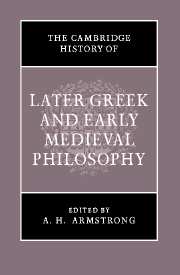Book contents
- Frontmatter
- Chapter 1 Introductory
- Part 1 GREEK PHILOSOPHY FROM PLATO TO PLOTINUS
- Part II PHILO AND THE BEGINNINGS OF CHRISTIAN THOUGHT
- Chapter 8 Philo
- Chapter 9 The beginning of Christian philosophy: Justin: the Gnostics
- Chapter 10 Clement of Alexandria
- Chapter 11 Origen
- Part III PLOTINUS
- Part IV THE LATER NEOPLATONISTS
- Part V MARIUS VICTORINUS AND AUGUSTINE
- Part VI THE GREEK CHRISTIAN PLATONIST TRADITION FROM THE CAPPADOCIANS TO MAXIMUS AND ERIUGENA
- Part VII WESTERN CHRISTIAN THOUGHT FROM BOETHIUS TO ANSELM
- Part VIII EARLY ISLAMIC PHILOSOPHY
- Select Bibliography
- Additional Notes and Bibliography
- Index of ancient and medieval works referred to in the text
- General Index
- Index of Greek terms
- References
Chapter 8 - Philo
from Part II - PHILO AND THE BEGINNINGS OF CHRISTIAN THOUGHT
Published online by Cambridge University Press: 28 March 2008
- Frontmatter
- Chapter 1 Introductory
- Part 1 GREEK PHILOSOPHY FROM PLATO TO PLOTINUS
- Part II PHILO AND THE BEGINNINGS OF CHRISTIAN THOUGHT
- Chapter 8 Philo
- Chapter 9 The beginning of Christian philosophy: Justin: the Gnostics
- Chapter 10 Clement of Alexandria
- Chapter 11 Origen
- Part III PLOTINUS
- Part IV THE LATER NEOPLATONISTS
- Part V MARIUS VICTORINUS AND AUGUSTINE
- Part VI THE GREEK CHRISTIAN PLATONIST TRADITION FROM THE CAPPADOCIANS TO MAXIMUS AND ERIUGENA
- Part VII WESTERN CHRISTIAN THOUGHT FROM BOETHIUS TO ANSELM
- Part VIII EARLY ISLAMIC PHILOSOPHY
- Select Bibliography
- Additional Notes and Bibliography
- Index of ancient and medieval works referred to in the text
- General Index
- Index of Greek terms
- References
Summary
The history of Christian philosophy begins not with a Christian but with a Jew, Philo of Alexandria, elder contemporary of St Paul. He was born probably about 25 B.C. and was dead by a.d. 50. Unyielding in meticulous observance of the Mosaic law as the infallibly revealed will of God not only for the chosen people but also for Gentile proselytes (for whose edification some of his writing is directed), Philo is also fully hellenized, presenting a very Greek face to the world. Hebrew he knew imperfectly if at all. His Bible is the Greek Old Testament, in which the Pentateuch towers in authority above the rest; and his belief that the Septuagint translation was divinely inspired relieved him of any need or responsibility to refer to the original text.
Judaism had come into violent conflict with ‘Hellenism’ at the time of the Maccabean struggle which saved Israel from the destruction of its distinctiveness. Monotheistic Jews could never accept a syncretism which identified Yahweh with Zeus. Yet neither could they turn their back on Hellenism and devote themselves to their private pieties in a mood of nationalistic particularism. For Judaism was a missionary religion, and the ancient prophetic vision of Israel's call to be a light to lighten the Gentiles precluded isolationism, even if this had been a practical possibility, which it was not. The Jews were dispersed through the Mediterranean world. Their language and culture became Greek through and through, and well-to-do Jewish parents (like Philo's) provided their sons with a liberal education under Greek tutors.
- Type
- Chapter
- Information
- Publisher: Cambridge University PressPrint publication year: 1967
References
- 1
- Cited by



